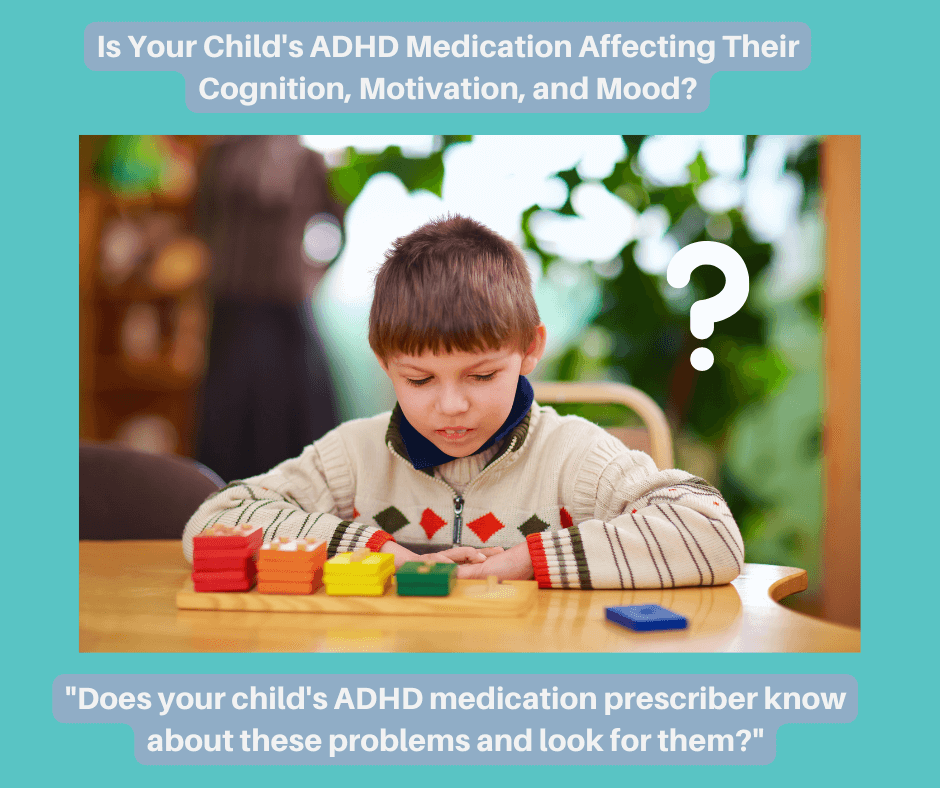Hey parents and teachers! Did you know that ADHD medications like methylphenidate (MPH) can potentially affect your child’s cognition, motivation, and mood?
“Is Your Child’s ADHD Medication Affecting Their Cognition, Motivation, and Mood?”
Here’s a quick summary of what we found in a recent study:
Cognitive side effects: slower attention, reduced creativity, sensory overload, poorer memory, and slower processing speed.


These side effects can be tricky to identify, but they might be the reason some kids stop taking their medication.

I’ve created a evidence-based questionnaire to answer these questions
Over the last 4 weeks, have you been worried that the medication is causing problems with clear thinking(“zoning out”/staring, Thoughts foggy or spacey), Motivation(Loss of intrinsic motivation, Less motivated to achieve goals) and mood(Dampening of mood/spontaneity,”Feel like I’d lost the spark”)?
Did you know that 89% of participants in a recent study reported at least one cognitive or motivational side effect from ADHD medication? Learn more about these lesser-known adverse effects and why having an expert prescribe your child’s medication is crucial for their well-being.
Hey there, parents of school-going and high-school kids with ADHD! We understand that navigating ADHD treatment can be quite a challenge, and that’s why we’re here to help. A recent study has revealed some surprising findings about the adverse effects of ADHD medication, particularly methylphenidate (MPH), on cognition, motivation, and mood.
We’re sure you’re curious about how this might impact your child’s treatment, so we’ve broken down the study in a way that’s easy for you to understand. Here are some critical insights you should be aware of:
- Cognitive effects: The study found that MPH could cause issues like reduced attention, changes in thinking patterns, lower creativity, sensory overload, poorer memory, and slower processing speed. These are important factors to consider when determining the best treatment plan for your child.
- Motivation issues: Some children on MPH may experience a loss of intrinsic motivation, develop an external locus of control, or have difficulties engaging in daily tasks. Some may even become more focused on rewards or incentives, which could impact their overall drive.
- Mood changes: MPH has been linked to dampening spontaneity, mood dysregulation, and increased anxiety. These emotional side effects can interfere with your child’s ability to focus and engage in tasks.
Now, you might be wondering: how can I ensure my child’s ADHD medication is being prescribed correctly? The answer is simple – make sure you work with an expert! An experienced ADHD medication prescriber will be aware of these potential issues and can help you navigate treatment more effectively.
In conclusion, it’s essential to be aware of the potential adverse effects of ADHD medication on your child’s cognition, motivation, and mood. By working with an expert prescriber, you can ensure your child receives the best possible treatment plan tailored to their needs. Don’t miss out on our full article, where we dive even deeper into this important topic – visit our website to learn more!
Motivation and Mood: Qualitative Investigation and the Generation of Items for the Medication and Cognition Rating Scale https://drflett.com/parent-follow-up-form/
Contact our friendly staff to schedule a consultation: 031 1000474

#ADHD #ADHDMedication #ParentingTip




